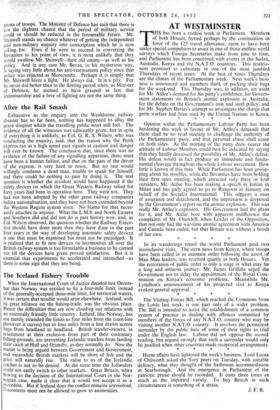AT WESTMINSTER
THIS has been a restless_ week in Parliament. Members of both House§, fretted perhaps by the continuation in force of the £25 travel allowance, seem to have been under special compulsion to assist in one of those endless world surveys which Foreign Secretaries make from time to time, and Parliament has been concerned with events in the Sudan, Australia, Kenya and the N.A.T.O. countries. This restless- ness promised to culminate in one of the most jumbled Thursdays of recent times. At the best of times Thursdays are the climax of the Parliamentary week. Next week's busi- ness is announced and members think of packing their bags for the week-end. This Thursday was, in addition, set aside for Mr. Attlee's demand for his party's confidence, for Govern- ment statements on Britain's atomic explosion in Australia, for the debate on the Government's iron and steel policy, and for Mr. Stephen Davies's attempt to investigate the charge that germ warfare had been used by the United Nations in Korea.
* * * * Opinion within the Parliamentary Labour Party has been hardening this week in favour of Mr. Attlee's demands that there shall be no rival meeting to challenge the authority of the Parliamentary party, and that personal abuse shall cease on both sides. As the meeting of the party drew nearer the attitude of Labour Members could best be indicated by saying that they hardly discussed the possibility of Mr. Attlee's defeat. His defeat would in fact produce an immediate and funda- mental cleavage throughout the whole Labour movement. How little is known of this man. While Parliament has been gossip- ping about his troubles, while the Bevanites have been holding their first open meeting, which attracted only three or four outsiders, Mr. Attlee has been making a speech in Italian in Milan and has gaily agreed to go to Rangoon in Januar"), on behalf of the Socialist International. This suggests a man of assurance and detachment, and the impression is deepened • by the Government's report on the atomic explosion. This-was really Mr. Attlee's explosion. His Government laid the plans for it, and Mr. Attlee bore with apparent indifference the complaints of Mr. Churchill, when Leader of the Opposition, that not only had the war-time atomic agreement with America and Canada been ended, but that Britain was without a bomb of her own. . * * * * In its wanderings round the world Parliament paid two inconclusive visits. The stern news from Kenya, where troops have been called in to maintain order following the arrest of Mau Mau leaders, was received quietly in both Houses. Yet the restoration of public order is only a stage in what may be a long and arduous journey; Mr. James Griffiths urged the Government not to delay the appointment of the Royal Com- mission on Kenya's economic problems. Meanwhile Mr. Lyttelton's announcement of his projected visit to Kenya evoked general approval. * * * * The Visiting Forces Bill, which reached the Commons from the Lords last week, is one part only of a wider problem. The Bill is intended to assist the establishment of a common system of practice in dealing with offences committed by members of the forces of any N.A.T.O. country who may be visiting another N.A.T.O. country. It involves the permanent surrender by the public here of some of their rights to trial under the English law. Labour did not oppose the second reading, but argued strongly that such a surrender would only be justified when other countries made reciprocal arrangements. * * * * ,Home affairs have lightened the week's business. Lord Lucas of Chilworth asked the Tory peers on Tuesday, with suitable delicacy, what they thought of the bathroom accommodation at Scarborough. And the emergence in Parliament of the patriotic prune should be recorded. It costs three times as much as the imported variety. To buy British in such circumstances is something of a strain. J. F. B.


































 Previous page
Previous page